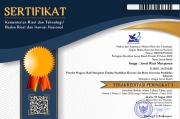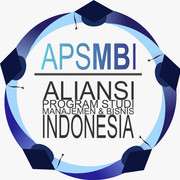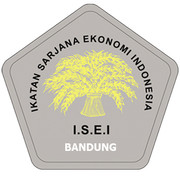Directive Leadership Style as a Mediator of Work Environment and Organizational Commitment Influences on Job Satisfaction
Abstract
Since 2022, there has been a change in the Organizational Structure and Work Procedures (also called as SOTK) in the Regional Apparatus Organization of Surabaya City, which has transferred the responsibility for the rehabilitation of school building facilities, infrastructure, and utilities from the Public Housing Service to the Education Service. This change also caused the transfer of 154 contract workers with the positions of craftsmen and assistant craftsmen to the Education Service. This study aims to analyse the influence of the work environment and organizational commitment on job satisfaction, with directive leadership style as a mediating variable. Data were analysed using the Structural Equation Model (SEM) with the help of SEM with smartPLS software. The research sample consisted of 61 respondents selected from 154 members of the Education Service task force through the stratified sample method. The results show that the questionnaire instrument is valid and reliable. The work environment and organizational commitment have a significant positive influence on job satisfaction, but directive leadership style is not proven to mediate this influence on the Surabaya City Education Service task force.
Keywords
Full Text:
PDFReferences
Awan, R.-N., & and Ather, T. (2024). The knowledge ties that bind: mediating effect of knowledge management on heads’ leadership and teachers’ performance. Cogent Education, 11(1), 2394740. https://doi.org/10.1080/2331186X.2024.2394740
Beylat, M., Karl-Andrew, W., Kai, S., & and Yzerbyt, V. (2020). Preference for directive versus participative leadership: the role of regulatory mode and context quality definition. Comprehensive Results in Social Psychology, 4(3), 290–314. https://doi.org/10.1080/23743603.2021.2001325
Ceballos, M., T., V., & and Gordon II, W. R. (2021). Educational leaders and the professional doctorate dissertation: an analysis of leaders’ interests within the educational leadership corpus. Research in Post-Compulsory Education, 26(3), 312–332. https://doi.org/10.1080/13596748.2021.1920261
Cheng, Z., & and Zhu, C. (2021). Academic Members’ Perceptions of Educational Leadership and Perceived Need for Leadership Capacity Building in Chinese Higher Education Institutions. Chinese Education & Society, 54(5–6), 171–189. https://doi.org/10.1080/10611932.2021.1990621
Cravens, X. C., & and Zhao, Q. (2023). Exercising instructional leadership with organisational management: a qualitative and comparative study of Chinese principalship. Compare: A Journal of Comparative and International Education, 53(7), 1225–1243. https://doi.org/10.1080/03057925.2021.2022455
Fang, M., & and Thanh, L. M. (2024). Developing paradoxical and authentic leadership: qualitative evaluation of leadership development among hotel managers and hospitality management educators in Vietnam. Asia Pacific Journal of Tourism Research, 29(5), 606–625. https://doi.org/10.1080/10941665.2024.2343068
Garengo, P., & and Betto, F. (2024). The role of organisational culture and leadership style in performance measurement and management: a longitudinal case study. Production Planning & Control, 35(2), 151–169. https://doi.org/10.1080/09537287.2022.2058431
Grice, C., Anette Forssten, S., & and Wilkinson, J. (2023). Decentring pedagogical leadership: educational leading as a pedagogical practice. Journal of Educational Administration and History, 55(1), 89–107. https://doi.org/10.1080/00220620.2022.2163381
Hallinger, P., Köksal, B., & and Gümüş, S. (2025). Scoping Review of Research on Digital Simulations and Serious Games in Educational Leadership and Management. Leadership and Policy in Schools, 24(1), 178–199. https://doi.org/10.1080/15700763.2024.2447315
Harris, A., & and Jones, M. (2021). Exploring the leadership knowledge base: evidence, implications, and challenges for educational leadership in Wales. School Leadership & Management, 41(1–2), 41–53. https://doi.org/10.1080/13632434.2020.1789856
Jakavonytė-Staškuvienė, D., & and Barkauskienė, A. (2023). Transformative teacher leadership experiences in schools in creating an innovative educational culture: The case of Lithuania. Cogent Education, 10(1), 2196239. https://doi.org/10.1080/2331186X.2023.2196239
Johnson, N. N., & and Fournillier, J. B. (2022). Increasing diversity in leadership: perspectives of four Black women educational leaders in the context of the United States. Journal of Educational Administration and History, 54(2), 174–192. https://doi.org/10.1080/00220620.2021.1985976
Kyambade, M., Regis, N., Joshua, M., & and Namatovu, A. (2024). I can’t express myself at work: encouraging socially responsible leadership and psychological safety in higher education setting. Cogent Education, 11(1), 2373560. https://doi.org/10.1080/2331186X.2024.2373560
Landri, P. (2024). Ecological materialism: redescribing educational leadership through Actor-Network Theory. Journal of Educational Administration and History, 56(1), 84–101. https://doi.org/10.1080/00220620.2023.2258343
Laureani, A., Jiju, A., Yasaman, S., & and Gountcheva, N. (2024). Leadership for quality: a systematic review and future directions. Total Quality Management & Business Excellence, 35(13–14), 1465–1508. https://doi.org/10.1080/14783363.2024.2370486
Matsunaga, M. (2022). Uncertainty management, transformational leadership, and job performance in an AI-powered organizational context. Communication Monographs, 89(1), 118–139. https://doi.org/10.1080/03637751.2021.1952633
Reynolds, D., & and McKimm, J. (2021). Educational management and leadership in Wales: promise, performance and potential. School Leadership & Management, 41(1–2), 54–72. https://doi.org/10.1080/13632434.2020.1816955
Woods, P. A., Amanda, R., Joy, J., & and Culshaw, S. (2021). Autonomy, leadership and leadership development in England’s school system. School Leadership & Management, 41(1–2), 73–92. https://doi.org/10.1080/13632434.2020.1811661
Wu, Q., Guoquan, C., & and Cormican, K. (2025). The Wisdom of the Collective: An Integrated Multi-Level Framework of Shared Leadership in Engineering Management Project Teams. Engineering Management Journal, 37(1), 114–132. https://doi.org/10.1080/10429247.2024.2370185
Zhu, C., & and Caliskan, A. (2021). Educational Leadership in Chinese Higher Education. Chinese Education & Society, 54(5–6), 161–170. https://doi.org/10.1080/10611932.2021.1990616
DOI: https://doi.org/10.17509/image.2025.005
Refbacks
- There are currently no refbacks.
Copyright (c) 2025 Ike Diyah Pravitasari, Dewie Tri Wijayati Wardoyo, Andre Dwijanto Witjaksono

This work is licensed under a Creative Commons Attribution-ShareAlike 4.0 International License.
Image : Jurnal Riset Manajemen is licensed under a Creative Commons Attribution-ShareAlike 4.0 International License
View My Stats



